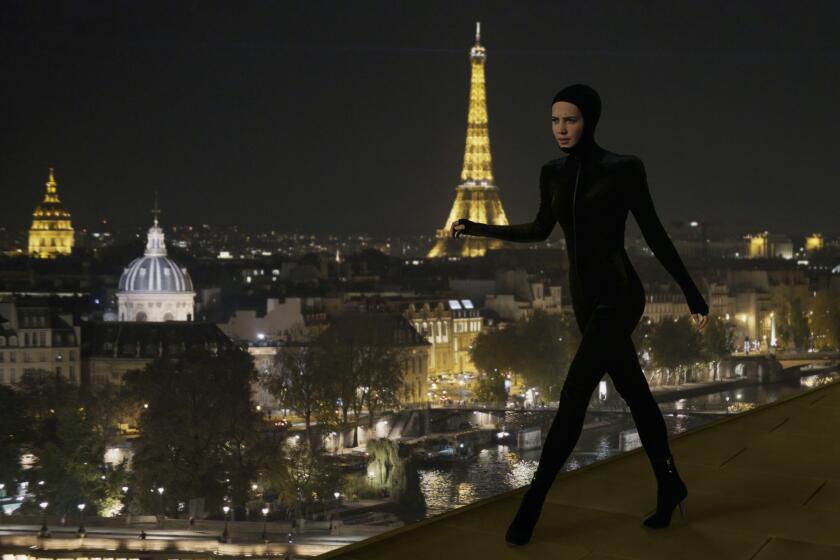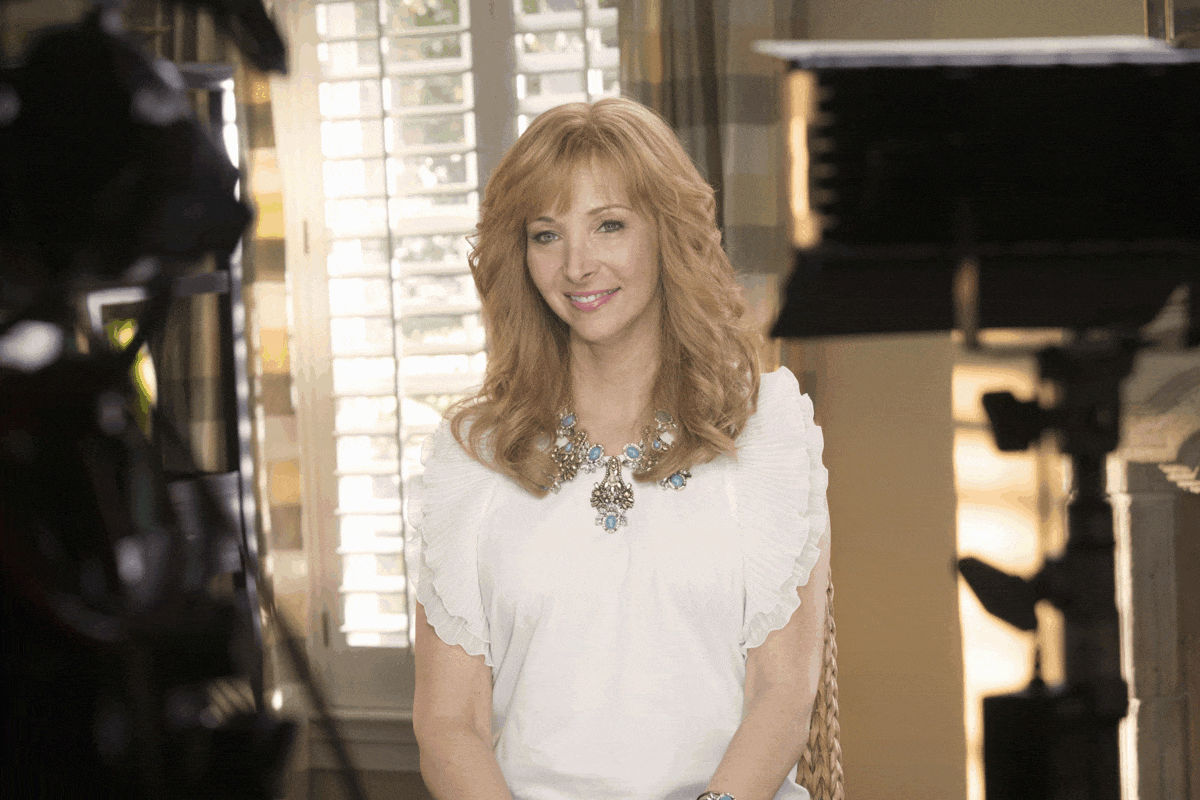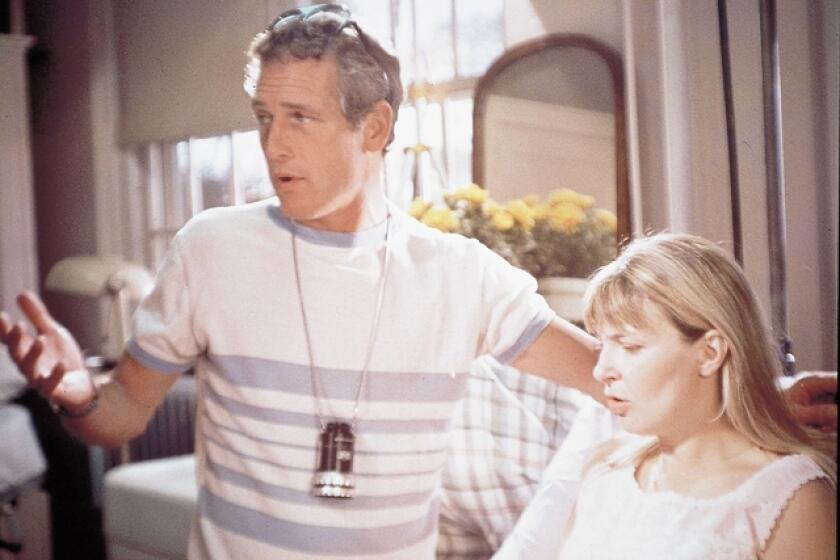An auteur and his superstar ex had ‘unresolved’ business. So he remade a classic: his own

- Share via
French filmmaker Oliver Assayas’ “Irma Vep,” a streaming series adaptation of his own movie adaptation of a silent serial, has become a stealthy summer treat, and the finale, premiering Monday on HBO and HBO Max, sends its characters spinning off in different directions with a joyfully knowing bit of surprise casting.
By turns playful, hypnotic, laceratingly funny and deeply vulnerable, the series goes to places Assayas could not in a feature film, exploring unexpected corners of the characters’ lives and personalities. As Assayas described the show, “It’s a serious comedy about cinema and the people who make it.”
In films such as “Demonlover,” “Summer Hours,” “Clouds of Sils Maria,” “Personal Shopper” and “Non-Fiction,” Assayas has long made nimble movies that meditate on the anxieties and issues of modern life, grappling with how technology and globalization impact people’s everyday interactions and relationships.
Produced by A24, the production company behind the juggernaut “Euphoria,” the series “Irma Vep” is an adaptation of Assayas’ 1996 film of the same name. In the movie, Hong Kong superstar Maggie Cheung played herself as a famous actor who has come to Paris to be in an independent adaptation of Louis Feuillade’s 1915 serial “Les Vampires.” An affectionate ode to filmmaking and life on set, the film is also a head-spinning exploration of identity, as Cheung’s character falls deeper into her part in the film.
With Alicia Vikander as a Hollywood star acting in a French crime serial, Olivier Assayas’ series refracts his 1996 masterpiece through a dizzyingly playful prism.
Assayas and Cheung would marry after shooting “Irma Vep”; by the time Assayas directed her again in 2004’s “Clean,” for which Cheung won the best actress prize at Cannes, they had divorced. Cheung subsequently retired from acting and recently made a rare public appearance while DJ-ing a party for Gucci in Hong Kong.
In the HBO series, international film star Mira Harberg (played by international film star Alicia Vikander) shoots a streaming adaptation of “Les Vampires” in France against the advice of her American agent, Zelda (Carrie Brownstein). As she navigates the production and its emotionally fragile director René Vidal (Vincent Macaigne) — who is haunted by memories of his former star and ex-wife Jade Lee (Vivian Wu) — Mira also deals with the competing needs of a volatile German actor Gottfried (Lars Eidinger), a flirty costume designer Zoe (Jeanne Balibar) and her own assistant Regina (Devon Ross).
Then there is her former assistant and ex-lover Laurie (Adria Arjona), who is in Paris with her new husband Herman (Byron Bowers), a director who recently made a blockbuster starring Mira. It all collides on set and in luxury hotels as Mira begins to question what she wants from her life and career.
Assayas recently joined The Times via video call from Italy while he was there on vacation. Between periodically slapping away mosquitos, he spoke about the connections between his original film and his new series.
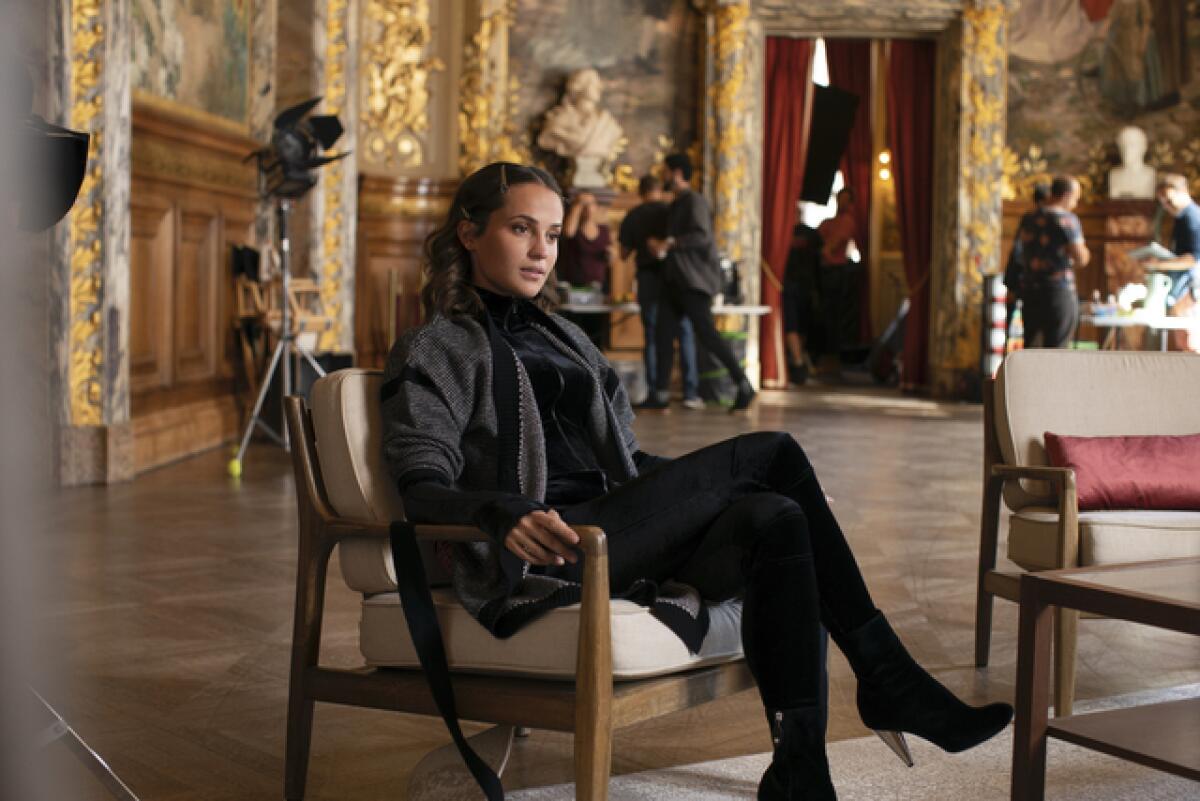
The new series feels reminiscent of your original movie but also like something totally new. Was that a challenge as far as what you wanted the tone to be?
Olivier Assayas: The original one was done in such crazy circumstances, and it was basically with no money, using Maggie, who ultimately changed my life. It’s my first film that gave me some kind of international recognition. But basically it’s still a small indie French film shot in four weeks. I knew that if I got myself into the process of making the series, working with HBO, A24 on an eight-hour canvas, whatever I do is going to be very different.
Here I am, in many ways, much closer to Feuillade’s serial, in the sense that it has a similar structure by episodes, and also we are in a completely different world. It has nothing to do with the world I lived in when I was making “Irma Vep.” We are in a moment of very deep transformation of whatever we call cinema, in terms of aesthetics, in terms of financing, in terms of viewing. “Irma Vep,” the original one and same with this one, has one foot in the past and one foot in the present.
Just about every interview about this new series, the first question is simply why, why make this? Have you been surprised by that as a response?
I’ve had to answer that question after every single movie I’ve made. It was not a big surprise. It’s always the question. It’s, “why this and not something else?” And if you make something else, they ask you why that something else and not some other thing. Why have I spent two years of my life writing, preparing, shooting, editing something on that scale based on a movie I was perfectly happy with? Ultimately the answer has to be in one way or another autobiographic. In a certain way, this project of broadening the range of “Irma Vep” in a new format, in a new context, allowed me to be much more personal and much more intimate. It’s kind of the standard answer I’m giving, but it’s the raw truth.
I became part of my own film. So if I am doing a film using as raw material my own film and my own experience of making it, there are two different layers. One layer is the actual filmmaking and the character of Irma Vep. And the other layer is obviously how the film changed my life, how I got married and then separated with Maggie. That was not part of the plan. That was not something I had in mind when I started thinking, but it’s something I realized when I started writing. I instantly realized that I’m part of this, willingly or unwillingly. Even if I I’ve always used a lot of biographical elements in my films, this is of a different nature. This is something I had never really confronted. There was a lot left unsaid.
We surveyed The Times TV team to come up with a list of the 75 best TV shows you can watch on Max (formerly HBO Max). And yes, your disagreement is duly noted.
Early in the series, René refers to the project he’s working on as an eight-hour movie. And that idea is something that gets batted around a lot as people talk about contemporary television. Were you thinking of this as one eight-hour movie or as eight one-hour projects?
I don’t want to seem as crazy as René does in the series, but to me it’s a novel in eight chapters. It’s one story. It seems self-evident: I wrote it all, I directed it all, I didn’t subcontract it to this or that director or this or that writer. I always had some kind of vision of the whole arc, and, again, it’s as personal as it gets. I feel like the characters in my film talking, but the history of serialization in novels begins in the 19th century. And most of the great novels of that time were serialized. So I have no problem with the format. The format gives me the possibility of dealing with things that obviously I would not be able to deal with in my films. And I could do it in a situation of complete freedom with partners, financiers, who were completely on the same wavelength. So what’s wrong with that? It would’ve been impossible for me to make that movie for the cinema. No one would have financed it. It would’ve made no sense.
Where does that leave the state of cinema? As someone who’s been invested in and concerned about the cinema, when you make a long-form project like this for television, what does that say about the current state of movies?
It doesn’t say much about that. I will be happy to make a feature format movie, and I have no plan for doing a series anytime soon. I mean, it’s exhausting. It’s really, really hard work on the scale I had no notion of. Honestly, in terms of how I write or how I function on a set, I can’t see the difference. “Irma Vep,” I shot it with the same crew I work with when I make my films. I have the same people around me. I function in a completely similar way. So I think that I am using the format of TV to give me space, length when I need it for a specific project.
But apart from that, what is the situation of cinema right now? That’s a tough one, because I think that the situation is difficult, to put it simply. One of the reasons, which to me is self-evident and not mentioned enough, is COVID. I don’t think the film audience has recovered from lockdown. It’s the same for theater, for concerts, everything that has to do with sitting in a theater for two hours will stay in trouble and has to be patient for the audience to gradually come back.
And they will come back. The difficulty is the way movies are financed nowadays. There is very little space for “auteur” filmmaking or independent filmmaking in the way things seems to be evolving right now. Those are the core of whatever cinema is about. And it’s in crisis because the money is not there. The distribution formats are not there. So it’s a moment of a lot of soul searching in terms of what cinema will be, where it’s heading and what is its future.
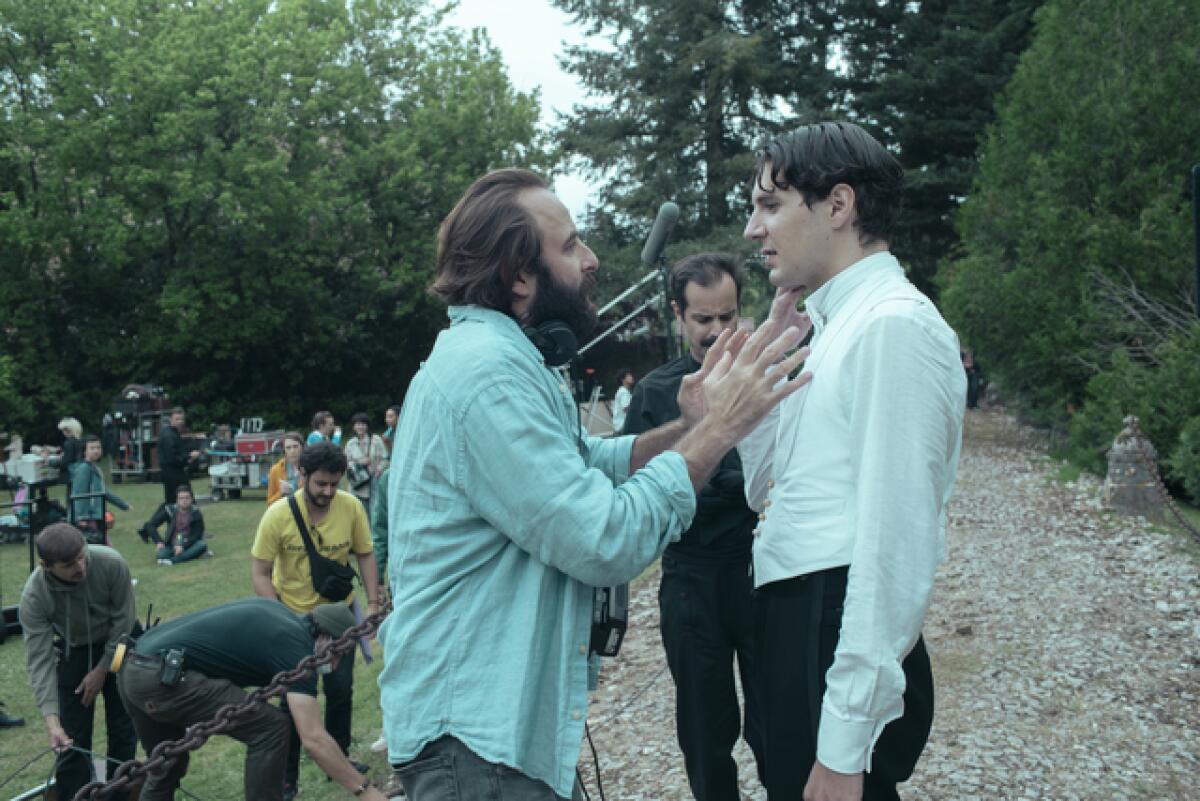
Are you yourself as haunted by your past relationship with Maggie Cheung as Rene is by his relationship with Jade Lee? Was that something you expected to explore when you started writing?
I’m haunted by the past, I’m haunted by the movies I made, I’m haunted by whatever made me the person I am. And Maggie, I suppose, is part of it. I’m perfectly happy now, and Maggie has completely vanished from my life and from my thoughts, but at the same time, when I had to go back to dealing with “Irma Vep,” it was also about scratching old wounds. I was partly aware that Maggie was still in my thoughts — there was something unresolved in terms of my relationship with Maggie. It was happy while it lasted and then it was gone.
And I’m not sure why, I’m still not completely sure of what happened. But it’s something that I had kind of left behind and making the film had me bring it back to the foreground, if only because I would not have felt comfortable if I didn’t have some sort of blessing from Maggie to use the kind of scene I was imagining. And connecting with her was not easy. I had no idea how to; the email address I had was long gone. And so I ended up connecting with her through her American agent or something like that.
I had to offer her to play her own part, which I’m not sure I would’ve been comfortable with in the end, but it was something that sounded, in terms of filmmaking, exciting. But I think she seriously doesn’t want to act anymore. So that was not an option. And I needed her to read the scenes and tell me if she had any problem with it. So she did that. And at that point, the character was called Maggie in the series. And the only thing she told me was, “It’s your story as much as mine, you do whatever you want, but I don’t think I would speak the way the character speaks. So I’m not sure using the name Maggie is the right choice.” And I changed the name.
In Alicia’s performance in the series “Irma Vep,” it often seems that she’s playing Kristen Stewart, who you directed in “Clouds of Sils Maria” and “Personal Shopper,” and there’s something of a payoff to that in the last episode. Was that something that you and Alicia spoke about? Where did the Kristen-ness of Mira come from?
I think everything that had to do with the issues of being a famous actress in Hollywood today is very clearly understood by Alicia without having to refer to Kristen. But obviously when I’m writing a story involving a movie star, I don’t know that many movie stars — it’s not the world I live in, I don’t go to Hollywood parties or whatever. I live a very private life in Paris and that’s pretty much it. But there is one movie star I know, I love, I admire, and that’s Kristen. So when I’m writing a character who happens to be a movie star, my reference point could be, can be, happens to be, sometimes Kristen, of course. And I like the idea that it was present without ever being said. And all of a sudden, in the last episode, something happens that the audience has imagined and would not have thought would actually happen, but it does.
Ethan Hawke, whose docuseries ‘The Last Movie Stars’ explores the pair, says they regularly shifted ‘who’s the rose and who’s the gardener.’
Kicking off with the movie “Irma Vep,” so much of your work since has been about internationalization, technology, the way we are all sort of connected now. And does this series feel like a summation on those themes?
I think I’m correct. I think that filmmaking is changing. I think that globalization of cinema is an important factor and I’ve been kind of surfing on it. And this series is ultimately where it was all leading to in a way because when I’ve made movies that dealt with those themes, they were always European financed and they were done from a completely European perspective.
The new “Irma Vep” is a hybrid, it’s an American-French series or a French-American series, half and half, maybe a little bit more American than French in many ways. And with a lead actress who happens to be Swedish, and great French actors, in an American series. All of a sudden those things mix in an exciting way. And in a more satisfying way for me than when I was only toying with it. What I am saying is that the series is kind of living proof that it can be done. You can make multinational films, and they can be a really exciting source of inspiration, and it can get financed. It’s a format where you mix languages and you mix cultures. Who wants that? Basically everybody. Everyone wants that because that’s how people live nowadays. That’s where the culture is.
Thinking about your adaptation of the movie “Irma Vep” into the series I couldn’t help but start to think how much I would enjoy watching a series made out of your films “Demonlover” or “Summer Hours.” If there is a Season 2 will you be you adapting a different one of your movies, or will it be the further adventures of Mira Harberg on another movie shoot?
Honestly, I don’t think I would direct Season 2. If HBO asks me, which has not happened for now, I think I would try to imagine something completely different and certainly not explore my own work. Either it could be based on “Judex” and directed by people I love like Claire Denis or Arnaud Desplechin or whoever if they’re interested. But initially, what I imagined when I was writing the pilot and the bible for the series, actually, what I had in the back of my mind as a sequel would be the shoot of “Barbarella” by Roger Vadim in 1960s Cinecittà. I thought there was a lot of comic potential. I think it could be funnier than Rene Vidal shooting “Les Vampires.”
More to Read
The complete guide to home viewing
Get Screen Gab for everything about the TV shows and streaming movies everyone’s talking about.
You may occasionally receive promotional content from the Los Angeles Times.
